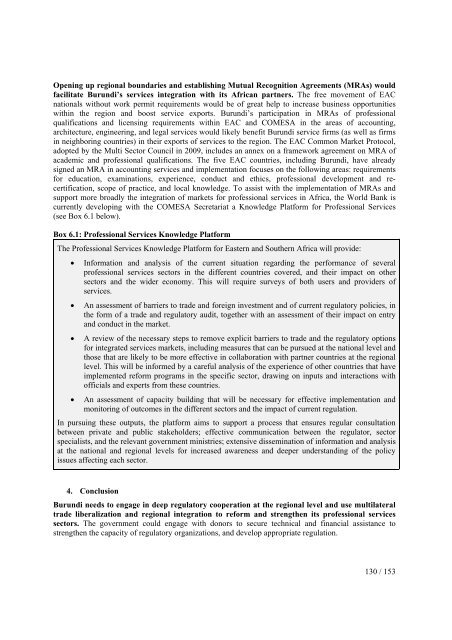(DTIS) Update, Volume 1 â Main report - Enhanced Integrated ...
(DTIS) Update, Volume 1 â Main report - Enhanced Integrated ...
(DTIS) Update, Volume 1 â Main report - Enhanced Integrated ...
You also want an ePaper? Increase the reach of your titles
YUMPU automatically turns print PDFs into web optimized ePapers that Google loves.
Opening up regional boundaries and establishing Mutual Recognition Agreements (MRAs) wouldfacilitate Burundi’s services integration with its African partners. The free movement of EACnationals without work permit requirements would be of great help to increase business opportunitieswithin the region and boost service exports. Burundi’s participation in MRAs of professionalqualifications and licensing requirements within EAC and COMESA in the areas of accounting,architecture, engineering, and legal services would likely benefit Burundi service firms (as well as firmsin neighboring countries) in their exports of services to the region. The EAC Common Market Protocol,adopted by the Multi Sector Council in 2009, includes an annex on a framework agreement on MRA ofacademic and professional qualifications. The five EAC countries, including Burundi, have alreadysigned an MRA in accounting services and implementation focuses on the following areas: requirementsfor education, examinations, experience, conduct and ethics, professional development and recertification,scope of practice, and local knowledge. To assist with the implementation of MRAs andsupport more broadly the integration of markets for professional services in Africa, the World Bank iscurrently developing with the COMESA Secretariat a Knowledge Platform for Professional Services(see Box 6.1 below).Box 6.1: Professional Services Knowledge PlatformThe Professional Services Knowledge Platform for Eastern and Southern Africa will provide: Information and analysis of the current situation regarding the performance of severalprofessional services sectors in the different countries covered, and their impact on othersectors and the wider economy. This will require surveys of both users and providers ofservices.An assessment of barriers to trade and foreign investment and of current regulatory policies, inthe form of a trade and regulatory audit, together with an assessment of their impact on entryand conduct in the market.A review of the necessary steps to remove explicit barriers to trade and the regulatory optionsfor integrated services markets, including measures that can be pursued at the national level andthose that are likely to be more effective in collaboration with partner countries at the regionallevel. This will be informed by a careful analysis of the experience of other countries that haveimplemented reform programs in the specific sector, drawing on inputs and interactions withofficials and experts from these countries.An assessment of capacity building that will be necessary for effective implementation andmonitoring of outcomes in the different sectors and the impact of current regulation.In pursuing these outputs, the platform aims to support a process that ensures regular consultationbetween private and public stakeholders; effective communication between the regulator, sectorspecialists, and the relevant government ministries; extensive dissemination of information and analysisat the national and regional levels for increased awareness and deeper understanding of the policyissues affecting each sector.4. ConclusionBurundi needs to engage in deep regulatory cooperation at the regional level and use multilateraltrade liberalization and regional integration to reform and strengthen its professional servicessectors. The government could engage with donors to secure technical and financial assistance tostrengthen the capacity of regulatory organizations, and develop appropriate regulation.130 / 153
















